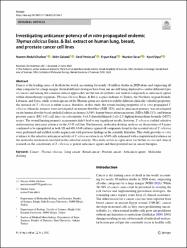| dc.contributor.author | Abdul Ghafoor, Naeem | |
| dc.contributor.author | Galatalı, Selin | |
| dc.contributor.author | Yeniocak, Sevil | |
| dc.contributor.author | Kaya, Ergun | |
| dc.contributor.author | Saraç, Nurdan | |
| dc.contributor.author | Uğur, Aysel | |
| dc.date.accessioned | 2022-08-08T08:02:24Z | |
| dc.date.available | 2022-08-08T08:02:24Z | |
| dc.date.issued | 2022 | en_US |
| dc.identifier.citation | Abdul Ghafoor, N., S. Galatali, S. Yeniocak, E. Kaya, N. Sarac, and A. Ugur. 2022. "Investigating Anticancer Potency of in Vitro Propagated Endemic Thymus Cilicicus Boiss. & Bal. Extract on Human Lung, Breast, and Prostate Cancer Cell Lines." Biologia. doi:10.1007/s11756-022-01168-7 | en_US |
| dc.identifier.issn | 00063088 | |
| dc.identifier.uri | https://doi.org/10.1007/s11756-022-01168-7 | |
| dc.identifier.uri | https://hdl.handle.net/20.500.12809/10165 | |
| dc.description.abstract | Cancer is the leading cause of death in the world, accounting for nearly 10 million deaths in 2020 alone and surpassing all other categories by a large margin. Several different strategies have been and are still being deployed to combat different types of cancers and among the common clinical approaches are the use of synthetic and natural compounds as anticancer agents within chemotherapy regimens. Thymus cilicicus Boiss. & Bal is a spice endemic to Turkey, the Northern Aegean Islands, Lebanon, and Syria, while several species of the Thymus genus are known to exhibit different clinically valuable properties, the research on T. cilicicus is rather scarce, therefore, in this study, the wound healing properties of in vitro propagated T. cilicicus ethanolic extracts were investigated on murine fibroblast (NIH-3T3), and its anticancer potency was investigated on the human alveolar basal epithelial adenocarcinoma (A549), human breast adenocarcinoma (MDA-MB-213), and human prostate cancer (DU-145) cell lines via colorimetric 3-(4,5-dimethylthiazol-2-yl)-2,5-diphenyltetrazolium bromide (MTT) assays. The wound healing property assessments didn’t lead to any significant results, however, T. cilicicus yielded selective and promising anticancer potency on the A549 cell line. Furthermore, molecular docking analyses on the proteins of 9 genes confirmed to be upregulated in both 3D and 4D A549 cultures against 48 compounds found in the essential oils of T. cilicicus were performed and yielded results acquiescent with previous findings in the scientific literature. This study provides in vitro evidence to the selective anticancer activity of T. cilicicus extracts on A549 cells enhanced with computational evidence on the molecular mechanism involved in this selective activity. This study serves as a precursor for further in vivo and clinical research on the constituents of T. cilicicus as potent anticancer agents and their potential use in cancer therapies. | en_US |
| dc.item-language.iso | eng | en_US |
| dc.publisher | Springer Science and Business Media Deutschland GmbH | en_US |
| dc.relation.isversionof | 10.1007/s11756-022-01168-7 | en_US |
| dc.item-rights | info:eu-repo/semantics/openAccess | en_US |
| dc.subject | Cancer | en_US |
| dc.subject | Thymus cilicicus | en_US |
| dc.subject | Lung cancer | en_US |
| dc.subject | Breast cancer | en_US |
| dc.subject | Prostate cancer · | en_US |
| dc.subject | Anticancer agents | en_US |
| dc.subject | Molecular docking | en_US |
| dc.title | Investigating anticancer potency of in vitro propagated endemic Thymus cilicicus Boiss. & Bal. extract on human lung, breast, and prostate cancer cell lines | en_US |
| dc.item-type | article | en_US |
| dc.contributor.department | MÜ, Fen Fakültesi, Biyoloji Bölümü | en_US |
| dc.contributor.authorID | 0000-0001-7676-542X | en_US |
| dc.contributor.institutionauthor | Saraç, Nurdan | |
| dc.relation.journal | Biologia | en_US |
| dc.relation.publicationcategory | Makale - Uluslararası Hakemli Dergi - Kurum Öğretim Elemanı | en_US |


















